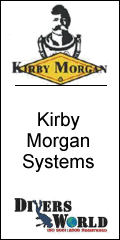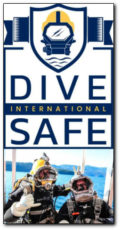Surviving a Ministry of Labour Diving Inspection: Part II
By CADC Admin ~ April 17th, 2019. Filed under: EDUCATION, Latest Diving News, Safety, Standards and Regulations.
In Part II of this two-part series, learn about inspection cooperation vs. self-incrimination, your right to ask questions (and which ones to ask), search warrants, and what your crew should know before inspections and how they should react to requests during them.
By Bob Landry, R.W. Landry & Associates Ltd.
In the previous article (reprint of Summer 2018 issue of CADC Magazine) Landry provided an overview of how the Canadian occupational health and safety system works both at the provincial and federal levels.
The primary responsibility of the government’s occupational health and safety (OHS) programs is to develop and enforce health and safety regulations that protect workers in the workplace. It has mandatory power to audit organizations for compliance of the workplace safety legislation and issue orders that may lead to penalties or prosecutions. Their inspectors conduct workplace inspections to make certain employers are complying with the regulations and providing a safe and healthful workplace.
OHS inspectors carry out these inspections / audits. An audit can be a tedious and stressful experience for employers and site supervisors since the inspector is empowered to initiate penalties on those who are in violation of the regulation.
I previously reviewed the possible consequences of non-compliance and pointed out the maximum penalties in Ontario. For an individual (worker / supervisor) in contravention of a regulation or an order, the punitive result may be $25,000 per charge and / or imprisonment for up to 12 months, or both, and for a corporation, $500,000 per charge. The director(s) of corporation may also be charged in the case of a worker fatality. Charges may also be laid under Bill C-45 of the Federal Criminal Act and result in imprisonment.
Also covered in the Part I article last issue were:
- Preparation, including responsibility for OHS at the dive site, and, most importantly, due diligence: job safety analysis;
- Documentation on-hand and at the dive site;
- The initial meeting;
- Audit tour; and
- Conclusion: Inspection field report, contraventions and orders to comply.
I must emphasize that it appears as though with government budget restraints—at least in Ontario—that their approach to OHS inspections and regulation enforcement is shifting. Specialists, such as those previously found in diving enforcement are being replaced by generalist inspectors who have a limited knowledge of commercial / occupational diving operations and legislation.
Often, the CSA Standards that are cited in the diving regulations are updated without a corresponding review by government OHS personnel. As I mentioned in Part I of this article, if contraventions are cited and orders are left, there will be an appeal period stated on the field visit form. It is imperative that if you feel the orders are unjust or in error, you must use this option immediately.
Remember, the paper trail will follow. If orders are left that you feel are just, then correct them immediately while the inspector is there. He can then record the non-compliance correction at the time of the visit. If time compliance orders are left, ensure you provide a statement of compliance as soon as possible to the inspector, as directed, and request a re-inspection of your operation.
What you don’t tell your employees can hurt you
When an OHS inspector shows up at a dive site, the first people he or she usually encounter are the diving crew and diving supervisor. What transpires between your crew and the inspector in those few moments can go in your favour—or come back to haunt you later.
Cooperation vs. self-incrimination
The start of the inspection is the crucial period, and it is one fraught with tension. One false or rude remark by a crew member, and you might be in for a rough ride. That’s why most companies tell their staff to be courteous and cooperative. In fact, there’s a legal duty to extend cooperation to government officials.
On the other hand, you don’t want your workers to be too cooperative. Those being inspected also have legal rights during inspections. Caving in to—or worse, anticipating—the inspector’s every demand can compromise your legal position. More than one company has been hit with higher fines because their workers gave away the store.
Your right to ask questions
The inspectors are not gods. They can’t just help themselves to whatever they want. Their authority is subject to your rights. The problem is that you need to understand and assert those rights. For example, you might have to turn down an inspector’s demands for certain information the government isn’t entitled to see, such as privileged audit reports. If you just roll over, you might end up forfeiting your rights.
The search warrant conundrum
Search warrants are a perfect illustration. Canadian provincial OHS laws grant inspectors broad rights to conduct workplace inspections to determine if an organization is in compliance with regulatory requirements. This includes access to the workplace and the right to see and make copies of documents without a warrant.
An inspector does not generally require a warrant to conduct an inspection. However, if the inspector is there not to conduct an inspection but is conducting an investigation, he or she likely needs a warrant. In contrast to an inspection, an investigation is undertaken in response to suspicion of wrongdoing for the purpose of gathering evidence for use in a prosecution. Since it’s essentially a criminal procedure, it implicates civil rights and liberties under the Charter, such as the right against self-incrimination and the right to a fair trial.
As a practical matter, however, since the same government officials generally have the authority to conduct inspections and investigations, it is often difficult for organizations to determine if they’re being inspected or investigated.
Alert the crew
Dive site crews are most likely to make first contact with the inspector. Or, if the visit is to your shop or office, the front desk attendants and receptionists at likely the first point of contact. They should all be instructed to contact a proper company representative before letting an inspector tour the operation or facility. A knowledgeable person, like a diving supervisor or business owner, should always meet with the inspector to determine the scope of his or her visit or investigation and accompany the official. In most cases, an inspector will wait up to 30 minutes for a company representative to come to the jobsite.

Tell your crew how to react to inspectors’ requests
It is important to train your workers to respond when inspectors appear at your site. One good way to get your point across is to adopt a company policy to direct the team.
What questions to ask
Tell the appropriate supervisor or manager at a jobsite to ask the inspector certain key questions to determine what the inspection is about and decide how to respond to it. For example, after discovering that an inspection was prompted by a complaint, a safety representative for a diving construction company directed an inspector to the tool that caused the injury and showed him how the company had since made the equipment safer with additional guards. The inspector was satisfied to limit his inspection to the area that the complaint focused on.
Key questions to ask an inspector include:
- What is the scope of the inspection? That is, what does the inspector plan to inspect?
- What is the reason for the inspection? Is it a random visit? Is it a programmed inspection? Is it in response to a complaint?
- What workplace records does the inspector propose to review?
- Which workers and company officials does he want to interview?
If a supervisor or manager isn’t available to ask these questions, the next-highest level official at the jobsite should. Or, somebody should ask the inspector to wait until a company representative arrives.
What to say
While workers should be instructed to be courteous and cooperative, they should also be advised not to befriend the inspector or offer information that isn’t asked for. Nor should they offer opinions, like whether or not something is in compliance. In addition, instruct workers to keep a detailed record of any conversations they have with inspectors and list any documents they hand over.
What your crew’s rights are
If an inspector does interview your workers, make sure they know they can have a lawyer or company representative present at the interview. This is important because it protects your company and lets you know what the inspector may use in a subsequent prosecution.
Summary
Set up a company policy to deal with OHS inspections. Distribute the policy to first line supervisors and other workers whom an inspector is likely to encounter. Be sure to adapt the policy to meet your company’s requirements and the laws of your province. And show the policy to your lawyer before distributing it.
Author: Bob Landry is founder of the Seneca College Underwater Skills Program, the Canadian Underwater Training Centre, and was acting Diving Program Coordinator for the Ontario Ministry of Labour for 22 years. He now operates his own health and safety consulting company and is the recent recipient of the Canadian Diving Industry’s Lifetime Service Award and the CSA Award of Merit. He can be reached at rwlandry@sympatico.ca.






